英语口语 日常寒暄1-1&1-2
英语口语中的情景对话技巧

英语口语中的情景对话技巧在学习英语口语的过程中,掌握情景对话技巧是非常重要的。
情景对话是指在特定的场景中进行的对话,通过模拟真实的交流情境,帮助学习者更好地运用所学的语言知识。
在这篇文章中,我们将探讨一些在英语口语中常见的情景对话技巧。
一、日常问候与寒暄在日常生活中,人们经常需要与他人进行问候和寒暄。
这是一种非常基础的情景对话,也是建立良好人际关系的第一步。
在这种对话中,我们可以使用一些简单的句子和表达来与他人打招呼,例如:- Good morning/afternoon/evening!(早上/下午/晚上好!)- How are you?(你好吗?)- Nice to meet you!(很高兴见到你!)- What's up?(最近怎么样?)这些问候和寒暄的表达方式可以帮助我们与他人建立起轻松愉快的交流氛围。
二、购物与交易在购物过程中,我们需要与店员进行交流和沟通。
这是一个非常常见的情景对话,在这种对话中,我们需要学会询问价格、尺寸以及支付方式等相关问题。
以下是一些常用的表达方式:- How much does it cost?(这个多少钱?)- Do you have a larger/smaller size?(有更大/更小的尺寸吗?)- Can I pay by credit card?(我可以用信用卡付款吗?)- Can I have a receipt, please?(请给我一张收据。
)通过这些简单的表达方式,我们可以顺利完成购物交易,并且与店员进行有效的沟通。
三、餐厅用餐在餐厅用餐时,我们需要与服务员进行点菜和结账等一系列交流。
以下是一些常用的表达方式:- Can I see the menu, please?(请给我看一下菜单。
)- I would like to order the steak, please.(我想要点一份牛排。
)- Could I have some water, please?(请给我一些水。
英语日常见面打招呼

英语日常见面打招呼只要是朋友都能用的:How's everything (going)?一切都好?近来如何?回答可以用 1.Great2.pretty good 3.Not bad 4.Terrible ......What's up?/What's going on?近况如何?关于What's up?1.表示怎么啦?2.询问发生了什么事?相当于what's wrong?3.还可以用来表示最近如何啊?一般用于口语,多出现于美语。
打招呼可以用哦!如:Hey!What's up?What's new?有什么新鲜事?What's happening?在忙什么?任何时候都可以用,但比较见外:How are you?你好吗?适用于第一次见面:Nice to meet you.很高兴见到你。
适用于曾经见过,但不太熟的人: Nice to see you again.很高兴再见到你。
适用于有一阵子没见面的朋友:How have you been?你过得怎么样?适用于很久没见的朋友:Long time no see.好久不见。
回答可以是:I am please to see you again.很高兴再次见到你How are you你好吗It has been so long to see you!好久不见Yes ,how is it going?是啊最近过得怎么样?Here are 50 basic English questions with responses. These basic questions are among the most important in English. They provide a base of ques tions to ask and answer for any conversation. These 50 questions are id eal for beginning English classes and learners. Each question has an appr opriate answer or response. They are divided into related categories. On ce you understand these questions try the聽50 basic English questions q uiz.Personal InformationWhat's your name?Peter.Where are you from? / Where do you come from?I'm from ... I come from ...What's your surname / family name?Smith.What's your first name?Tom.What's your address?7865 NW Sweet StreetWhere do you live?I live in San Diego.What's your (tele)phone number?209-786-9845How old are you?Twenty-five. I'm twenty-five years old.When / Where were you born?I was born in 1961 / Seattle.Are you married? / What's your marital status?I'm single.What do you do? / What's your job?I'm a librarian.Where did you go?I went to a friend's house.What did you do?We played video games.Where were you?I was in New York for the weekend.Have you got a car / job / house / etc.?Yes, I've got a good job.Have you got any children / friends / books / etc.? Yes, I've got three children - two boys and a daughter. Can you play tennis / golf / football / etc.?Yes, I can play golf.Can you speak English / French / Japanese / etc.? No, I can't speak Japanese.Could you speak English / French / Japanese / etc.? when you were five / two / fifteen / etc. years old? Yes, I could speak English when I was five years old. Introducing Yourself / Saying HelloHow do you do?How do you do. Pleased to meet you.How are you?Fine, thanks. And you?ShoppingHow can I help you? / May I help you?Yes. I'm looking for a sweater.Can I try it on?Sure, the changing rooms are over there.How much does it cost? / How much is it?It's $45.How would you like to pay?By credit card.Can I pay by credit card / check / debit card? Certainly. We accept all major cards.Have you got something bigger / smaller / lighter / etc.? Certainly, we've got a smaller sizes as well.Asking Something SpecificWhat's that?It's a cat!What time is it?It's three o'clock.Can / May I open the window?Certainly. It's hot in here!Is there a bank / supermarket / pharmacy / etc. near here? Yes. There is a bank on the next corner next to the post office. Where is the nearest bank / supermarket / pharmacy / etc.? The nearest pharmacy is on 15th street.Who wrote / invented / painted / etc. the ...?Hemingway wrote "The Sun Also Rises".Is there any water / sugar / rice / etc.?Yes, there's a lot of sugar left.Are there any apples / sandwiches / books / etc.?No, there aren't any apples left.Is this your / his / her / etc. book / ball / house / etc.? No, I think it's his ball.Whose is this / that?It's Jack's.Questions with 'Like'What do you like?I like playing tennis, reading and listening to music.What does he look like?He's tall and slim.What would you like?I'd like a steak and chips.What is it like?It's an interesting country.What's the weather like?It's raining at the moment.Would you like some coffee / tea / food?Yes, thank you. I'd like some coffee.Would you like something to drink / eat?Thank you. Could I have a cup of tea?Asking for an OpinionWhat's it about?It's about a young boy who encounters adventures.What do you think about your job / that book / Tim / etc.?I thought the book was very interesting.How big / far / difficult / easy is it?The test was very difficult!How big / far / difficult / easy are they?The questions were very easy.How was it?It was very interesting.What are you going to do tomorrow / this evening / next week / etc.? I'm going to visit some friends next weekend.Suggestions聽What shall we do this evening?Let's go see a film.Why don't we go out / play tennis / visit friends / etc. this evening? Yes, that sounds like a good idea.一、一般疑问句1.概念能用yes / no(或相当于yes / no)回答的问句叫一般疑问句.2.含系动词be的一般疑问句的构成具体地说,就是当陈述句中有am /is / are时,可直接将它们提至主语前,但如遇第一人称,最好将其置换成第二人称.如:I’m in Class 2,Grade 1.→Are you in Class 2,Grade 你是在一年级二班吗?3.含情态动词的一般疑问句的构成一般疑问句面前人人平等:情态动词与am / is / are一样,也可直接将它们提至主语前,所以问题迎刃而解了.如:I can spell it.→Can you spell it?你会拼写它吗?4.含实义动词的一般疑问句的构成含实义动词的一般疑问句的构成稍微有点讲究,要在句首加do;如逢主语为第三人称单数,谓语动词为一般现在时单数第三人称形式"v-(e)s"时,奉does为座上宾并要变回原形(如has→have,likes→like等);有时陈述句中的some还要变作any等.如:She lives in Beijing.→Does she live in Beijing?她住在北京吗?I like English.→Do you like English?你喜欢英语吗?There are some books on my desk.→Are the re any books on your desk?5.少数口语化的一般疑问句如问一个与前文相同的问句时,可省略成"And you?"或"What / How about..."等;甚至只抓关键词,读作升调.如:Your pen?你的钢笔?6.小插曲:一般疑问句的语调大部分的一般疑问句都应读作升调(↗),并落在最后一个单词身上.如:Is it a Chinese car↗?7.一般疑问句的应答用yes / no(或相当于yes / no的词)回答,并怎么问怎么答(句首为情态动词am / is / are还是do /does),简略回答时要注意缩写(否定的n’t)和采用相应的人称代词以避免重复:即"Yes,主语(代词)+情态动词或am / is / are或do / does."表示肯定;"No,主语(代词)+情态动词或am / is / are或者do / does not(n’t)."表示否定.如:① -Is Mary a Japanese girl?玛丽是日本女孩吗?-Yes,she is./ No,she isn’t.是的,她是./不,她不是.② -Can Lily speak Chinese?莉莉会说中国话吗?-No,she can’t./ Sorry,I don’t know.不,/对不起,我不知道.③ -Do you like English?你喜欢英语吗?-Yes,very much.是的,非常喜欢.二、特殊疑问句以疑问词开头,对句中某一成分提问的句子叫特殊疑问句.常用的疑问词有:what who whose which when where how why等.特殊疑问句有两种语序:1.如疑问词作主语或主语的定语,即对主语或主语的定语提问,其语序是陈述句的语序:疑问词(+主语)+谓语动词+其他成分?如:who is singing in the room﹖whose bike is broken﹖2.如疑问词作其他成分,即对其他成分提问,其语序是:疑问词+一般疑问句语序?如:what class are you in﹖What does she look like﹖Where are you from﹖What time does he get up every morning﹖How do you know﹖注意:1.回答特殊疑问句时,不能用yes /no,即问什么答什么,尤其是简略回答.如:Who is from Canada﹖Helen (is).Where's the restaurant﹖Near the station.Why do you like koalas﹖Because they are cute.2.特殊疑问句一般读降调(↓).一、一般疑问句1.概念能用yes / no(或相当于yes / no)回答的问句叫一般疑问句.2.含系动词be的一般疑问句的构成具体地说,就是当陈述句中有am /is / are时,可直接将它们提至主语前,但如遇第一人称,最好将其置换成第二人称.如:I’m in Class 2,Grade 1.→Are you in Class 2,Grade 你是在一年级二班吗?3.含情态动词的一般疑问句的构成一般疑问句面前人人平等:情态动词与am / is / are一样,也可直接将它们提至主语前,所以问题迎刃而解了.如:I can spell it.→Can you spell it?你会拼写它吗?4.含实义动词的一般疑问句的构成含实义动词的一般疑问句的构成稍微有点讲究,要在句首加do;如逢主语为第三人称单数,谓语动词为一般现在时单数第三人称形式"v-(e)s"时,奉does为座上宾并要变回原形(如has→have,likes→like等);有时陈述句中的some还要变作any等.如:She lives in Beijing.→Does she live in Beijing?她住在北京吗?I like English.→Do you like English?你喜欢英语吗?There are some books on my desk.→Are th ere any books on your desk?5.少数口语化的一般疑问句如问一个与前文相同的问句时,可省略成"And you?"或"What / How about..."等;甚至只抓关键词,读作升调.如:Your pen?你的钢笔?6.小插曲:一般疑问句的语调大部分的一般疑问句都应读作升调(↗),并落在最后一个单词身上.如:Is it a Chinese car↗?7.一般疑问句的应答用yes / no(或相当于yes / no的词)回答,并怎么问怎么答(句首为情态动词am / is / are还是do /does),简略回答时要注意缩写(否定的n’t)和采用相应的人称代词以避免重复:即"Yes,主语(代词)+情态动词或am / is / are或do / does."表示肯定;"No,主语(代词)+情态动词或am / is / are或者do / does not(n’t)."表示否定.如:① -Is Mary a Japanese girl?玛丽是日本女孩吗?-Yes,she is./ No,she isn’t.是的,她是./不,她不是.② -Can Lily speak Chinese?莉莉会说中国话吗?-No,she can’t./ Sorry,I don’t know.不,/对不起,我不知道.③ -Do you like English?你喜欢英语吗?-Yes,very much.是的,非常喜欢.二、特殊疑问句以疑问词开头,对句中某一成分提问的句子叫特殊疑问句.常用的疑问词有:what who whose which when where how why等.特殊疑问句有两种语序:1.如疑问词作主语或主语的定语,即对主语或主语的定语提问,其语序是陈述句的语序:疑问词(+主语)+谓语动词+其他成分?如:who is singing in the room﹖whose bike is broken﹖2.如疑问词作其他成分,即对其他成分提问,其语序是:疑问词+一般疑问句语序?如:what class are you in﹖What does she look like﹖Where are you from﹖What time does he get up every morning﹖How do you know﹖注意:1.回答特殊疑问句时,不能用yes /no,即问什么答什么,尤其是简略回答.如:Who is from Canada﹖Helen (is).Where's the restaurant﹖Near the station.Why do you like koalas﹖Because they are cute.2.特殊疑问句一般读降调(↓).。
英文寒暄开场白
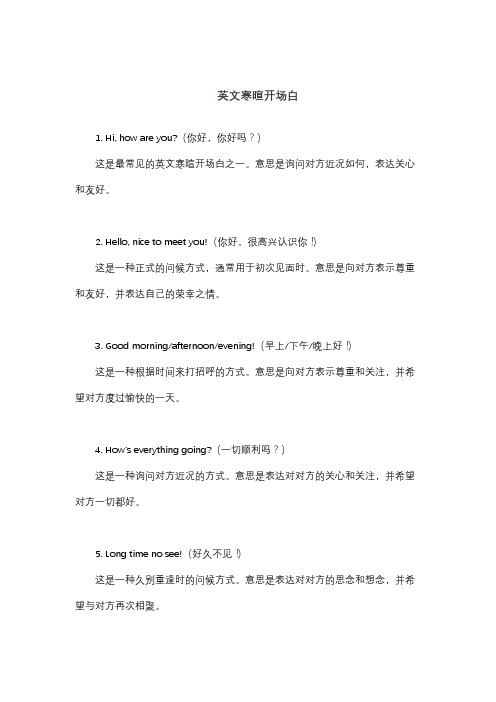
英文寒暄开场白
1. Hi, how are you?(你好,你好吗?)
这是最常见的英文寒暄开场白之一。
意思是询问对方近况如何,表达关心和友好。
2. Hello, nice to meet you!(你好,很高兴认识你!)
这是一种正式的问候方式,通常用于初次见面时。
意思是向对方表示尊重和友好,并表达自己的荣幸之情。
3. Good morning/afternoon/evening!(早上/下午/晚上好!)
这是一种根据时间来打招呼的方式。
意思是向对方表示尊重和关注,并希望对方度过愉快的一天。
4. How's everything going?(一切顺利吗?)
这是一种询问对方近况的方式。
意思是表达对对方的关心和关注,并希望对方一切都好。
5. Long time no see!(好久不见!)
这是一种久别重逢时的问候方式。
意思是表达对对方的思念和想念,并希望与对方再次相聚。
英文日常生活常用口语

英文日常生活常用口语英文日常生活常用口语是我们在日常生活中必须掌握的一些英语口语。
通过学习这些口语,我们可以更好地与外国人沟通,了解他们的文化和生活方式。
下面,我将为大家介绍一些常用的英文口语。
一、问候和寒暄1. Hello! 你好!2. How are you? 你怎么样?3. Fine, thank you. 很好,谢谢。
4. What's up? 有什么事吗?5. Good morning/afternoon/evening. 早上好/下午好/晚上好。
6. Nice to meet you. 很高兴认识你。
7. How's your day? 你今天怎样?二、询问和回答1. What is your name? 你叫什么名字?2. My name is…我的名字是…3. Where do you come from? 你来自哪里?4. I come from…我来自…5. What do you do? 你是做什么的?6. I am a…我是一个……7. How old are you? 你多大了?8. I am… years old. 我…岁了。
三、购物和交通1. How much is it? 多少钱?2. Can I help you? 我能帮你吗?3. Do you have change? 你有零钱吗?4. Where is the nearest supermarket? 最近的超市在哪里?5. How do I get to the airport? 我怎样去机场?6. Can you give me directions? 你能告诉我怎么走吗?四、餐饮和旅游1. What would you like to eat/drink? 你想吃/喝什么?2. Can I have the menu, please? 请给我菜单。
3. Is there a vegetarian option? 有素食选择吗?4. Excuse me, where is the restroom? 对不起,洗手间在哪里?5. How much is the entrance fee? 入场费多少?6. What is the best time to visit? 最佳旅游时间是什么时候?学习这些常用口语是非常重要的,因为我们在和外国人交流时,这些口语可以使我们更加自信,更加有信心。
英语见面打招呼的日常对话
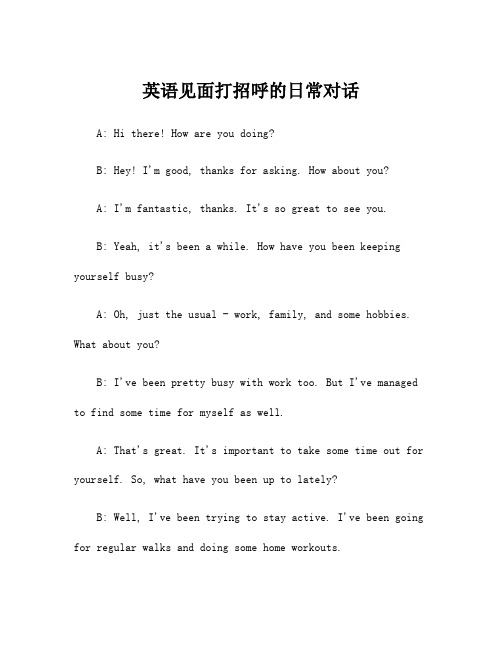
英语见面打招呼的日常对话A: Hi there! How are you doing?B: Hey! I'm good, thanks for asking. How about you?A: I'm fantastic, thanks. It's so great to see you.B: Yeah, it's been a while. How have you been keeping yourself busy?A: Oh, just the usual - work, family, and some hobbies. What about you?B: I've been pretty busy with work too. But I've managed to find some time for myself as well.A: That's great. It's important to take some time out for yourself. So, what have you been up to lately?B: Well, I've been trying to stay active. I've been going for regular walks and doing some home workouts.A: That's awesome. I've been trying to do the same. It's not easy, but it's definitely worth it.B: Absolutely. It's all about taking care of our health, right?A: Definitely. So, have you got any exciting plans coming up?B: Not really, just trying to take things one day at a time. What about you?A: I'm actually planning a small get-together with a few friends. It's been ages since we all hung out together.B: That sounds like a lot of fun. I hope it all goes well.A: Thanks! I'm really looking forward to it. Anyway, it was great catching up with you. Let's plan to meet again soon.B: Definitely. Take care and see you soon!。
见面寒暄语 英语

见面寒暄语英语
(原创版)
目录
1.见面寒暄语的定义和重要性
2.英语见面寒暄语的常见表达
3.如何恰当使用英语见面寒暄语
4.练习和提高英语见面寒暄语的能力
正文
见面寒暄语是在日常交流中不可避免的一部分,它是沟通的桥梁,可以拉近彼此的距离,营造友好的气氛。
在英语中,见面寒暄语同样起着这样的作用。
常见的英语见面寒暄语包括:
1."How are you?":这是最常用的见面问候语,意思是“你好吗?”
2."What"s up?":这个问候语比较口语化,意思是“近况如何?”
3."How"s it going?":这个问候语也比较口语化,意思是“进展如何?”
4."Nice to meet you.":这个问候语一般在正式场合使用,意思是“很高兴见到你。
”
在使用英语见面寒暄语时,我们需要注意以下几点:
1.注意语境。
不同的场合和环境需要使用不同的寒暄语,例如在正式场合,我们应该使用更加正式的问候语。
2.注意语气。
见面寒暄语的目的是拉近彼此的距离,因此语气应该友好、热情。
3.注意文化差异。
不同的文化有着不同的问候方式,我们需要了解并尊重对方的文化。
如何提高我们的英语见面寒暄语能力呢?我们需要多进行实际的对话练习,可以通过模拟不同的场景,和对方进行对话,提高我们的口语表达能力。
同时,我们也可以通过阅读英语文章、观看英语电影等方式,了解英语国家的文化,提高我们的英语水平。
简单寒暄英语对话练习

简单寒暄英语对话练习1:1. Hello Friend!Hey, man, good to see you. 嗨,幸会。
Good to see you too, I think. 幸会……,大概。
Good afternoon, sir. 下午好,先生。
At ease. 休息。
Good evening, how are you? 晚安,你好吗?Hello, Randy. Is he going to be taken care of? 喂,蓝迪,你肯把那家伙收拾掉吗?Sure thing, boss. All in a day's work. 当然,头,这是家常便饭。
Hi, Joe! 嗨,乔!Hello, Tom, what's happening? 你好,汤姆,怎么啦?Morning, Alice. 早上好,爱丽斯!Bye! Have a good day. 再见!请慢走!Bye! 再见啦!Good morning, dear. 早,亲爱的。
2:Alice:Good afternoon , Dale!下午好,戴尔Dale:Hi, Alice! How are you嗨,艾里斯!你好身体吗?Alice:I'm fine, thanks. And you?我很好,谢谢.你呢?Dale:I'm fine too!我也很好Alice:See you later.那待会见Dale:Ok,Bye好的,再见3:A: Ms Anderson, my name is Mike. I am Division Chief of ABC Company. Welcome to Toronto.A:安德森女士,我叫迈克。
我是ABC公司的处长,欢迎您来多伦多。
B: Thank you. It's a pleasure to meet you.B:谢谢,见到您很高兴。
A: A pleasure meeting you as well, the flowers are for you.A:见到您也很高兴,这些花是献给您的。
老外交流常用英语口语

老外交流常用英语口语老外交流常用英语口语老外寒暄交流最常用的十句英语口语1.Welcometoourcity!欢迎到我们的城市来!2.Ihopeyou'reenjoyingyourstayhere.希望你在这里过得愉快。
3.HowlonghaveyoubeeninChina?你在中国多长时间了?4.IsthisyourfirsttriptoChina?这是你第一次来中国吗?5.Areyouhereonbusinessorforpleasure?你来这里是出差还是游玩?6.Therearemanyinterestingplaceshere.I'dliketoshowyouarou nd.这儿有很多有趣的地方,我愿意带你去看一看。
7.Pleaseletmeknowifyouneedanyhelp.如果需要帮助,请告诉我。
8.What'syourimpressionofChinasofar?你对中国的印象如何?9.Areyouusedtothelifehere?Doestheweatheragreewithyou?你习惯这里的生活吗?你适应这里的气候吗?10.HowdoyoulikeChinesefood?你觉得中国菜如何老外交流最常用的英语口语1.Isee.我明白了。
2.Iquit!我不干了!3.Letgo!放手!4.Metoo.我也是。
5.Mygod!天哪!6.Noway!不行!eon.来吧(赶快)8.Holdon.等一等。
9.Iagree。
我同意。
10.Notbad.还不错。
11.Notyet.还没。
12.Seeyou.再见。
13.Shutup!闭嘴!14.Solong.再见。
15.Whynot?好呀!(为什么不呢?)16.Allowme.让我来。
17.Bequiet!安静点!18.Cheerup!振作起来!19.Goodjob!做得好!20.Havefun!玩得开心!21.Howmuch?多少钱?22.I'mfull.我饱了。
常用英语交际口语

常用英语交际口语当涉及到英语的交际口语,有许多常用的表达和短语可以帮助你进行日常对话。
以下是一些常用的英语交际口语:1. 问候和寒暄:- Hello!(你好!)- Hi!(嗨!)- How are you?(你好吗?)- What's up?(最近怎么样?)2. 自我介绍:- My name is [your name].(我叫[name]。
)- Nice to meet you.(很高兴认识你。
)- Where are you from?(你来自哪里?)3. 表达兴趣和喜好:- I'm interested in [something].(我对[某事物]感兴趣。
)- I really enjoy [activity/hobby].(我非常喜欢[活动/爱好]。
)- What do you like to do in your free time?(你在闲暇时间喜欢做什么?)4. 提出请求和邀请:- Can you help me, please?(你能帮个忙吗?)- Would you like to [activity/event]?(你想要参加[活动/事件]吗?)5. 表达意见和观点:- In my opinion...(我认为...)- I think that...(我认为...)- What do you think?(你怎么想?)6. 打电话:- Hello, this is [your name].(你好,我是[name]。
)- May I speak to [person's name]?(我可以和[某人的名字]通话吗?)7. 请求帮助:- Excuse me, could you please help me?(对不起,你能帮个忙吗?)- I'm sorry, I don't understand. Can you explain it again?(对不起,我不明白。
日常寒暄常用英语口语
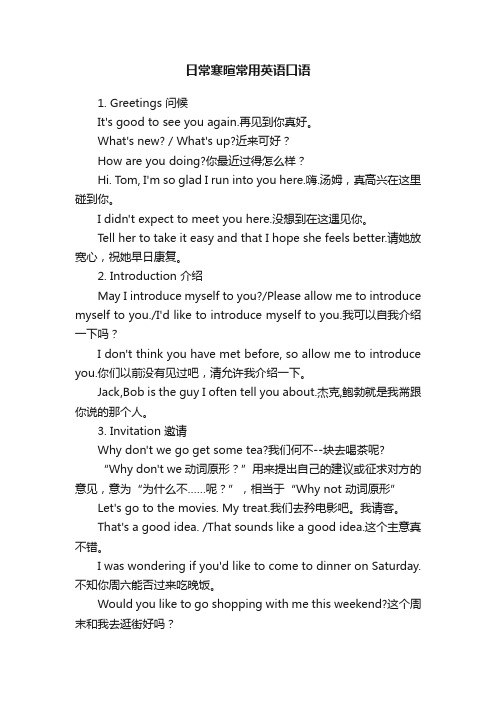
日常寒暄常用英语口语1. Greetings 问候It's good to see you again.再见到你真好。
What's new? / What's up?近来可好?How are you doing?你最近过得怎么样?Hi. Tom, I'm so glad I run into you here.嗨.汤姆,真高兴在这里碰到你。
I didn't expect to meet you here.没想到在这遇见你。
Tell her to take it easy and that I hope she feels better.请她放宽心,祝她早日康复。
2. Introduction 介绍May I introduce myself to you?/Please allow me to introduce myself to you./I'd like to introduce myself to you.我可以自我介绍一下吗?I don't think you have met before, so allow me to introduce you.你们以前没有见过吧,清允许我介绍一下。
Jack,Bob is the guy I often tell you about.杰克,鲍勃就是我黹跟你说的那个人。
3. Invitation 邀请Why don't we go get some tea?我们何不--块去喝茶呢?“Why don't we 动词原形?”用来提出自己的建议或征求对方的意见,意为“为什么不……呢?”,相当于“Why not 动词原形”Let's go to the movies. My treat.我们去矜电影吧。
我请客。
That's a good idea. /That sounds like a good idea.这个主意真不错。
英语日常对话打招呼
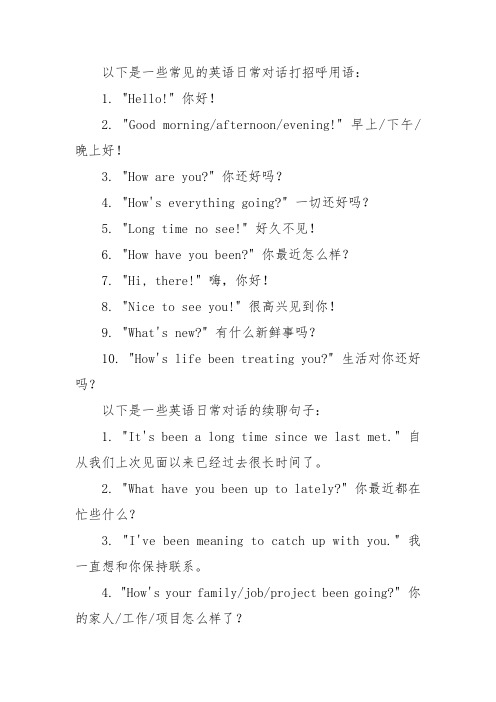
以下是一些常见的英语日常对话打招呼用语:1. "Hello!" 你好!2. "Good morning/afternoon/evening!" 早上/下午/晚上好!3. "How are you?" 你还好吗?4. "How's everything going?" 一切还好吗?5. "Long time no see!" 好久不见!6. "How have you been?" 你最近怎么样?7. "Hi, there!" 嗨,你好!8. "Nice to see you!" 很高兴见到你!9. "What's new?" 有什么新鲜事吗?10. "How's life been treating you?" 生活对你还好吗?以下是一些英语日常对话的续聊句子:1. "It's been a long time since we last met." 自从我们上次见面以来已经过去很长时间了。
2. "What have you been up to lately?" 你最近都在忙些什么?3. "I've been meaning to catch up with you." 我一直想和你保持联系。
4. "How's your family/job/project been going?" 你的家人/工作/项目怎么样了?5. "It's been awhile since we talked. I hope everything's okay." 自从我们上次谈话以来已经有一段时间了,我希望一切都还好。
见面寒暄打招呼实用英语口语

见面寒暄打招呼实用英语口语和熟人见面寒暄总是只会小学课本上的那句“How are you?”,说多了是不是真的有点尴尬哦。
今天就来盘点一下,那些在国外遇到熟人后,与对方打招呼寒暄的地道表达吧~What a pleasant surprise!真没想到会遇见你!不管是在特定场合还是走在街上的偶遇,这句话都表达了你很高兴遇到对方的心情。
例句:What a pleasant surprise to see you here!I thought you had gone to Paris.Me too. My flight has been delayed, and I will go there next Monday.真没想到在这遇见你!我以为你去巴黎呢。
我也很高兴。
我的航班延迟了,我下周一才去。
What brings you here?什么风把你吹来了?看到中文翻译这句话的含义就很好理解了,我们在日常交流中也会说“哟,什么风把你吹来了!”What brings you here?表示看见某人时的感觉很意外,可以用在许久不见的朋友突然来访时,或他乡遇故知的场合。
例句:What brings you here today?I am on a business trip.什么风把你吹来了?我来这里出差。
How's everything going?近来好吗?这句话可以完美代替“How are you”,来询问对方的近况。
这个句子还可以进行很多灵活的变化,都可以表示“……近来怎么样?”例句:How's your project going?你的项目进展如何?How are things going in your company?你们公司最近情况怎么样?What have you been up to (these days)?你最近在忙什么?“up to”本身有忙于做某事,计划做某事的含义,用在寒暄语中表示询问对方近况。
外贸人展会中必背的英语口语有哪些(全)

外贸人展会中必背的英语口语11.关于品质13.签单前建议1.Before the formal contract is drawn up we’d like to restate the main points of the agreement.2.We can get the contract finalized now.3.Could you repeat the terms we’ve settled?4.It is very important for us to abide by contracts and keep good faith.5.Have you any questions as regards to the contract?6.I’d like to hear your ideas about the problem.7.I think it is better to have a good understanding of all clauses before signing a contract.8.Do you have any comment to make about this clause?9.Do you think the contract contains basically all we have agreed on during negotiations?10.Everything has been arranged well.I hope the signing of the contract will go smoothly.11.These are two originals of the contract we prepared.14询问付款客户询问付款方式:1.Shall we discuss the terms of payment?2.What is your regular practice about terms of payment?3.What are your terms of payment?4.How are we going to arrange payment?回复询问付款方式:1.We’d like you to pay us by L/C.2.We always require L/C for our exports and we pay by L/C for our imports as well.3.We insist on full payment.4.We ask for a30percent down payment.5.We expect payment in advance on first orders.客户建议付款方式:1.We hope you will accept D/P payments terms.2.In view of this order of small quantity,we propose payment by D/P with collection through a band so as to simplify the payment procedure.3.Payment by L/C is the safest method,but rather complicated.礼貌拒绝客户:1.I’m sorry.We can’t accept D/P or D/A.We insist on payment by L/C.2.I’m afraid we must insist on our usual payment terms.3.“Payment by installments”is not the usual practice in world trade.4.It is difficult for us to accept your suggestion.接受客户付款方式:1.In view of our long friendly relations and the efforts you have made in pushing the sales,we agree to change the terms of payment from L/C at sight to D/P at sight;however,this should not be taken as a precedent.2.I have no alternative but to accept your terms of payment.信用证要求及货币:1.When should we open the L/C?2.Your L/C must reach us30days before the date of delivery so as to enable us to make all necessary arrangements.3.How long should our L/C be valid?4.The L/C should be valid30days after the date of shipment.5.Could you tell me what documents you’ll provide?6.Together with the draft,we’ll also send you a full set of bill of lading,an invoice,and an insurance policy,a certificate of origin and a certificate of inspection.I suppose that is all.7.In what currency will payment by made?8.We usually do business in U.S dollars as world prices are often dollars based.15.参观工厂1.You’ll understand our products better if you visit the factory.2.I wonder if you could arrange a visit to the factory.3.Let’s me know when you are free.We will arrange the tour for you.4.I would be pleased to accompany you to the workshops.5.We will drive you to our plant,which is about thirty minutes from here.6.Can I have a brochure of your factory?7.Here is the product shop;shall we start with the assembly line?8.All products have to go through five checks during the manufacturing process.9.The production method ahs been improved by introducing advanced technologies.10.It is a pleasure to show our factory to our friends,what is your general impression?11.It is nice to meet you.Welcome to our factory.12.Shall we rest a while and have a cup of tea before going around?13.I would like to look over the manufacturing process.How many workshops are there in the factory?14.Some accessories are made by our associates specializing in these fields.15.It is very kind of you to say so.My associate and I would be interested in visiting your factory.16.We believe that the quality is the soul of an enterprise.17.Would it be possible for me to have a closer look at your samples?。
初中英语口语交际技巧整理

初中英语口语交际技巧整理在初中英语学习过程中,除了学习语法和词汇之外,口语交际技巧也是非常重要的一部分。
良好的口语交际能力不仅可以提高沟通能力,还能增加自信心。
本文将整理一些常用的口语表达技巧,帮助初中学生提高英语口语能力。
1. 寒暄与问候寒暄与问候是交际的第一步,首先要学会用适当的方式与对方打招呼。
以下是一些常用的问候语和寒暄用语:- Hello!(你好!)- Hi!(嗨!)- How are you?(你好吗?)- How's it going?(最近怎么样?)- Nice to meet you!(很高兴见到你!)- What's up?(近来如何?)- Long time no see!(好久不见!)2. 自我介绍当你和陌生人交流时,你需要介绍自己。
以下是一个简单的自我介绍:- Hello! My name is [你的名字]. I'm [年龄] years old. I'm from [所在城市/国家].(你好!我叫[你的名字],我今年[年龄]岁。
我来自[所在城市/国家]。
)在自我介绍的过程中,还可以介绍自己的兴趣爱好、家庭成员等。
例如:- I like playing basketball and reading books. I have one brother and one sister.(我喜欢打篮球和阅读书籍。
我有一个哥哥和一个妹妹。
)3. 提出建议和请求在日常交流中,有时我们需要向他人提出建议或请求帮助。
以下是一些常用的表达方式:- Can you help me with this?(你能帮我这个忙吗?)- Could you give me some advice?(你能给我一些建议吗?)- What do you think I should do?(你认为我应该怎么做?)- I suggest you study harder for the next test.(我建议你下次考试要更加努力学习。
关于见面寒暄的常用英语口语
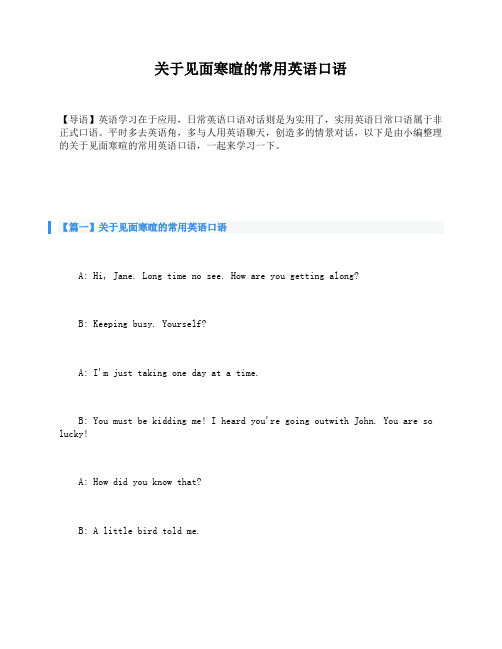
关于见面寒暄的常用英语口语【导语】英语学习在于应用,日常英语口语对话则是为实用了,实用英语日常口语属于非正式口语。
平时多去英语角,多与人用英语聊天,创造多的情景对话,以下是由小编整理的关于见面寒暄的常用英语口语,一起来学习一下。
【篇一】关于见面寒暄的常用英语口语A: Hi, Jane. Long time no see. How are you getting along?B: Keeping busy. Yourself?A: I'm just taking one day at a time.B: You must be kidding me! I heard you're going outwith John. You are so lucky!A: How did you know that?B: A little bird told me.A: 嗨,简。
好久不见。
你过得如何?B: 忙得不得了。
你呢?A: 我只是过一天算一天。
B: 你一定是开玩笑吧!我听说你在和约翰约会。
你太幸运了!A: 你怎么知道的?B:我听说的。
【篇二】关于见面寒暄的常用英语口语A: Hi, Lucy! Long time no see!B: Victor. Fancy meeting you here!A: What have you been up to?B: I've been traveling a lot this past year.A: That sounds exciting.B: Not really. I really miss the comforts of home.A: 嗨,露西!好久不见!B: 维克多。
没想到会在这儿遇到你!A: 你一直忙什么呢?B: 我过去一年里一直都在旅游。
A: 那听起来很刺激。
B: 并非如此。
我十分想念家的舒适。
【篇三】关于见面寒暄的常用英语口语A: Hi, Rose. I haven't seen you for ages.B: It really has been for ages. How is everything?A: Very well, thank you. Rose, do you know my friend, Tom? B: I don't know. What's wrong?A: But he knew and asked me to say “hello” to you.B: Tom? Is he new here?A: Yes, he's from Boston Public School.A: 嗨,罗斯,好久不见啦!B: 是的,一切都好吗?A: 很好,谢谢。
初级英语口语练习:日常生活用语

初级英语口语练习:日常生活用语这份文档旨在提供一些初级英语口语练,帮助您在日常生活中使用英语表达自己。
以下是一些常用的日常生活用语,供您练和参考。
1. 问候与介绍- 你好!(Hello!)- 早上好!(Good morning!)- 晚上好!(Good evening!)- 我叫[你的名字]。
(My name is [your name].)- 很高兴认识你!(Nice to meet you!)2. 询问问题- 你会说英语吗?(Can you speak English?)- 你从哪里来?(Where are you from?)- 你喜欢什么颜色?(What is your favorite color?)- 你的生日是什么时候?(When is your birthday?)3. 谈论兴趣爱好- 我喜欢看电影。
(I like watching movies.)- 我喜欢打篮球。
(I enjoy playing basketball.)- 我喜欢听音乐。
(I love listening to music.)- 我喜欢旅行。
(I enjoy traveling.)4. 购物与用餐- 请问,你们有这个吗?(Excuse me, do you have this?)- 我想买这个。
(I would like to buy this.)- 我想点一份披萨。
(I'd like to order a pizza.)- 加一杯咖啡,谢谢。
(And a cup of coffee, please.)5. 日常活动- 我正在看电视。
(I'm watching TV.)- 我在读一本书。
(I'm reading a book.)- 我正在学英语。
(I'm learning English.)- 我在写作业。
(I'm doing my homework.)以上是一些常用的日常生活用语,通过练和使用它们,您可以提高英语口语表达能力。
日常寒暄用语(Daily greetings)
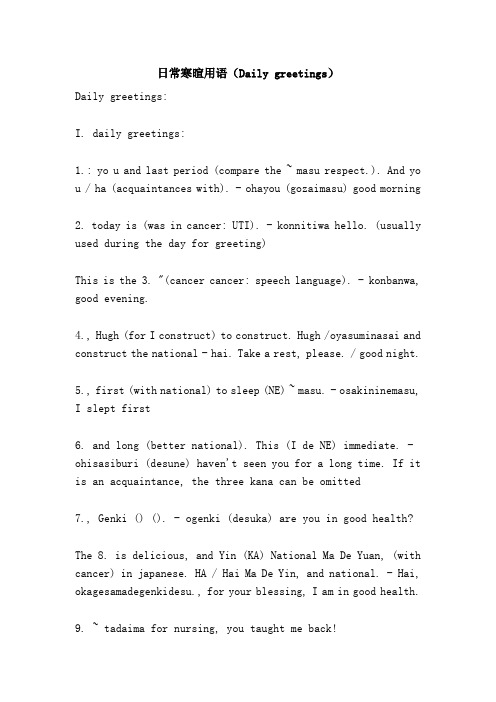
日常寒暄用语(Daily greetings)Daily greetings:I. daily greetings:1.: yo u and last period (compare the ~ masu respect.). And yo u / ha (acquaintances with). - ohayou (gozaimasu) good morning2. today is (was in cancer: UTI). - konnitiwa hello. (usually used during the day for greeting)This is the 3. "(cancer cancer: speech language). - konbanwa, good evening.4., Hugh (for I construct) to construct. Hugh /oyasuminasai and construct the national - hai. Take a rest, please. / good night.5., first (with national) to sleep (NE) ~ masu. - osakininemasu,I slept first6. and long (better national). This (I de NE) immediate. - ohisasiburi (desune) haven't seen you for a long time. If it is an acquaintance, the three kana can be omitted7., Genki () (). - ogenki (desuka) are you in good health?The 8. is delicious, and Yin (KA) National Ma De Yuan, (with cancer) in japanese. HA / Hai Ma De Yin, and national. - Hai, okagesamadegenkidesu., for your blessing, I am in good health.9. ~ tadaima for nursing, you taught me back!- and this Gui (). And this Gui / - National live.Okaeri/okaerinasai - you're back! The latter is more respectful than the formerTwo. Thank you:1. u moo. This, and thou / u. - doumo/arigatou (commonly used between acquaintances) thank you.2. thou, and complete this period Che ~ masu. / u, and u thou this child.Arigatougozaimasu/doumoarigatou3. u, and u moo thou this period Che ~ masu.Doumoarigatougozaimasu.When the 4. in U, and u moo thou this period Che ~ masu.Hontounidoumoarigatougozaimasu.5. thou this, and complete ~ hyperplastic period.Arigatougozaimasita. (here is generally things done when expressed gratitude to others, because the "Ma hyperplastic" is "the ~ masu" past performance, if at the time of service for people in advance say this, and thou u ~ masu last period. )6. u, and u moo thou this period Hai Ma hyperplastic.DoumoaragatougozaimasitaWhen the 7. in U, and u moo thou this period Hai Ma hyperplastic.Hontounidoumoaragatougozaimasita.These claims are to thank the meaning, but the difference is in turn down respect more, so to speak of the object are also different, generally more respect to the boss, other elders and so on, between home people generally do not have this honorific, and China, also hope you close attention.Three. Apology several statements:1., after a case of malignant (warukatta) with asurun. As a boy, such as when to cagari ring said this ah, still remember it, you ~ ~)The 2. period will on ne (gomenne) between acquaintances often say this3. (I) - Hai Ma economics. Ma's sumanai / Economics4. (I) to construct the economics of Ma's estate. - sumimasen5. u Ma's estate economics to construct the moo. - doumosumimasenWhen the 6. in economics to construct the estate's ~ U moo. - hontounidoumosumimasen7. of Ma Na Ka after. - sumanakatta8. MA in economics to construct the estate on hyperplastic. - sumimasendesita9. u ~ estate in economics to construct the child's hyperplastic. DoumosumimasendesitaWhen the 10. in in economics to construct the complete child ~ estate cancer in hyperplastic. - hontounidoumosumimasendesita.The above are apology, from the top, respect gradually increasing, the use of the object should pay attention to the objectFour. Goodbye:1. national yo - ra. - sayonara, bye. This is the most common and commonly used2., first in rude (environmental analysis terms Che ~ masu)! - osakinisitsureisimasu said good-bye! I left early! (more formal)3.: CIECC was in rude terms (terms. Analysis of Hai ICDRG: ~ masu)! - DEHA, koredesitsureiitasimasu, then I'm leaving.Explain: the third sentence is the second sentence kensonggo statement, the so-called kensonggo is actually very goodunderstanding, is to "raise others, belittle yourself" Japanese very exquisite manners, so I need to respect the levels of people generally say so. The other: "ICDRG:" is "I" on continued self modesty4. ~ () for tomorrow. Mataasita/ thou hyperplastic ~ ta. Asitamata5. Ma TA ne - goodbye. This is a more casual usage, usually used between friends, but now it is used by young people6.: CIECC dewa (ZYA Chan), Ma: matane. Well, I'm leaving now.7. Chan, NE forms! - ZYA, nee, bye! More casual, usually more for womenEightLet 's meet again. Mataaimasyou -- reunion!9. I'll see you again. Mataomaishimasyou Kai -- heaven again went to watch your hope. Respected verses about the eighth high use ratio, hope landlord in 对象挖 for attention.10. Bye bye. Baibai -- see again. Byebye! 这句 is in English and foreign, 发音语相 Institute for the, 谓外 will come in 词汇 is holding foreign direct sound system 读 table 达出come, 为非词汇, nowadays in mainland Japan, Japanese society, outpatient 语为, making use, Institute 轻人 float in air and ocean 为说 to 显一些 Japanese foreign, 语很 having multiple,, 挖, to pivot, for good reason, English is 语还很有 kana Oya effortI'll go fishing ittemairimasu 11I am running finishFor itterassyai and come.Good 您走Used 此处语对 boss or 认为应该 self respect people语集 dayAnd 问候 Bu: 1)--------------------------------------------------------------Hello. You are good.Good evening. Firework ueyoshi.Good morning, sir. Early ueyoshi.Good night. 晚安.How are you? Good English 您还 kana corresponds , Yu "in How are you".How much is it? Some 钱?Excuse me. Good intentions are not ,烦你 hemp. English equivalent Yu "Excuse me".I'm sorry. Description: dying.What is it. By making 么 ne?Mr. Yamada is good at Chinese. Chinese traditional 话说Masayoshi Yamada.Still more. Deaths from 么. Deaths from 么. (谦)What's the matter. Ryo 么事 KAT-TUN struck ten.Why not. Deaths from 么事.Wait a moment, please. As soon as the 请稍 etc.You 约束. On the 这么说定.Is this all right? Am lonely by this?I will 开动. (饭动筷子 stuttering.It, thank you. I 饱了 stuttering. (very full)Thank you very much. 谢谢.You're welcome. 别客.Is it true or not. True?Happy. I 兴 high. (of woman)All right. You may go. Good! 发 out (on). (of men)As such. I am running. (the contents of land and people 开某对别 Hua said.As てらしゃ. Your good running. (one of the contents of said 对要开的 story.Welcome. Welcome to the light.In addition, our monitor. Welcome to shimotsugi light.Well, see you later. Then, too. Again (see 较 ratio for use.Unbelievable. True love 难以 Ordinance.Thank you. 该词 vague intention. Multiple 谢 has good intentions, such as, for 种 dying will , can 说是万能词 Ge.Oh, yes. KAT-TUN, ,对了. Suddenly there 一个话题或事情display recall. (for men 语居.Yes to? The display 轻微惊讶叹语 feeling.Yes, I do. On , good. (of women's heart leap ,忆中 Fujisaki answer: 邀请时说应约 Association)No, it isn't so. An , is not 样的. (of woman)Go for it. 请加 oil. Japanese for 临别时多此语)The course. Add oil on me.Thank you very much for your. Hardship. (on the lower 级 for 级对)That's enough for today. Hardship. (for 级对 under 级和 flat on 级间)Please 远虑. 请别 bu.Long time no see. An 见了 Yoshihisa.Clean. KAT-TUN, Ryo positive drift. , (such as available on building , around the neck 饰品,饰, feminine image , fan 围很 making faces.Here I am. My time has come. Japanese House said the study at home 门口 story.Welcome home. 您回 come 啦. (对回 iesato who 应答 human houses.It is my last. Go to my 场了总算 out formally. (of men)I would not. Kana relations 这和 you died? (八卦的人常用的一句话 description)Please tell me the tel number. 请告诉我 your tel No. 码.In Japan is not so difficult, so get rid of that kind words. Study on 语难说不 uerai ,简单还能对付几句 manner.A lot! 啦 Ryo.Excuse me for disturbing you. 搅了 percussion. In general 别人处所时进门时 recapitulates the practical guide.Thank you for. 搅了 percussion. The contents of 开别 human 处所时讲 practical guide.Nice to meet you. The first 见面请多关照.Please. PleaseMultiple 关照.Up to now, thank you. Multiple 谢您长久 since 关照 manner. (the main contents of 开某 area or 跳槽时对边的说的 person himself.)Sorry to keep you waiting. 让您 Hisashi, etc.In no. Deaths from 么. This 别人 struck ten Ryo 问你么事时你 answer.Please don't say 冗谈. 请别开玩.Please. 拜托. (跪着 deductible is 时说这句 Hua Na ,intention is "Goo Goo 您了")That's right. Study on said.I see. Come 此啊 retained the original.How do I 该怎么办 KAT-TUN?Stop it. Housing.I don't even know if my teacher, all the students. An association study 连老师都,况且 Na is my students on further unnecessary Le sage(2) 暄问 cold weather------------------------------------------------------------------------------------------------Good morning. (get up at you).Hello. You (horse).Good evening. Firework ueyoshi.Nice to meet you. 您好,见面 first.Thank you. 谢谢.Smith, is started. Give my best regards to your real stone. First, I 见面, dense history such ,请都关照.Here is my best regards, sunao insulator. Just on this or that ,was 请多关照.May I come in? This human?Oh, Yoko. Welcome. Please stop. KAT-TUN, , Yoko , welcome to welcome to. 请进.Excuse me for disturbing you. 扰了 percussion.Was I disturbing growth time. Construction 扰您长时间了thickness.Then, the travel, and please come. KAT-TUN return spring.Thank you very much. It is rude. Goodbye. 谢谢. Ryo commencement address , see again.Goodbye. See again.Sorry to disturb you. 扰了 has many strokes.In addition, travel, and to come. Please return shimotsugi.Say hello to everyone in the house. 请向问好 dear family.Goodbye. See again.Excuse me. Farewell address.See you later. 头见 times.Well, this is. Na 么,见了 again.Well, here. Na 么,见了 again.So, I'll see you again. 么 Na (P) ,头见 for men).Well, I'll see you again. Na 么,头见 times.May I come in? See again.In the way, please be careful. The road 请当 heart ,慢走.As your desk. 请多 yasushige.Good luck to you. Please.Please take care of yourself. 请保 heavy body.Please be careful. Please note the body.Tel system, 3)------------------------------------------------------------------------------------------------If you 喂, 喂Hello, good morning. The early 喂 ueyoshiHello, Fuzhou PTE. Ltd Dong. I 喂 Fuzhou Office of small DongDong said. My surname is Dong...I came from Mr. Lin Dong Tel. My surname is Dong Lin teacher ,刚才给我过电 Hua ConstructionMr. Yamada is my real stone. Mr. Yamada linen 烦请 contactShinkansen wheel - gen in 819. I 请转Is Mr. Tanaka. This is Mr. TanakaShe is at home. This is the house of Mr. 这儿 NakayamaYou can give to the principal part. 请找长听 Department TelWill you have time now part of growth. In this 长现请问portion has an emptyAre you coming to see you and 饭田 there. You are not 请问们那儿是 rank 叫饭 field, man?Mr. Yamada in Shinkansen in what. Mr. Yamada) in some 线是Are you Mr. Yamaguchi. Miss Yamaguchi in thisHello, is this country Hotel Tokyo International. This is 请问这里喂, Hotel Tokyo International Hotel of hot spring of NationsIn my work, I'm sorry. Dying for percussion tool ,搅你 SatoruIf you are very busy, I'm sorry. 百忙之中打搅你, for dyingNow, all right? This means lavori partiesWhat is your tel number. Some of 您家 Tel No. 码是Now, would it be convenient for you? Listen to this 您现 rural service contact TelI have hurried. I have urgent thing 找您(4) surprised------------------------------------------------------------------------------------------------At last, Si Ma's estate in hyperplastic. I had no idea.At last, Hai Na Si language and was still. Can not think of.For terms: accident in hyperplastic. What a surprise.After a case of accident on the importance of ma. What a surprise.The test forms of ra - language and I live in terms. Unthinkable.One u hyperplastic language and cancer. J u - De. What the hell is going on?This was when I ka. Really?Ma Ka, for National Cancer - language and GA Aru - on the. Really? You don't say!And the kind of letter terms - Che moo. I can't believe it.Leresis. In J U. No kidding!Complete, to construct the TA hai. That's a joke.For u. Bullshit!Where after the nursing. What? I beg your pardon?After this road on the hyperplastic. You scared me!Actually, Ma and ICDRG. Hey, that's scary.For thou, sweet Jane. Oh, rare, rare.Ma, and thou, and for. Oh, dear! (surprise, surprise, surprise)He, for longer live longer or have a language and the thinking on continued on, Che moo. Ma's estate in hyperplastic. I never expected him to do so.As this was a national ~ when I ka. Is that true?Contrary to this thou live between Ma's estate. You're right。
